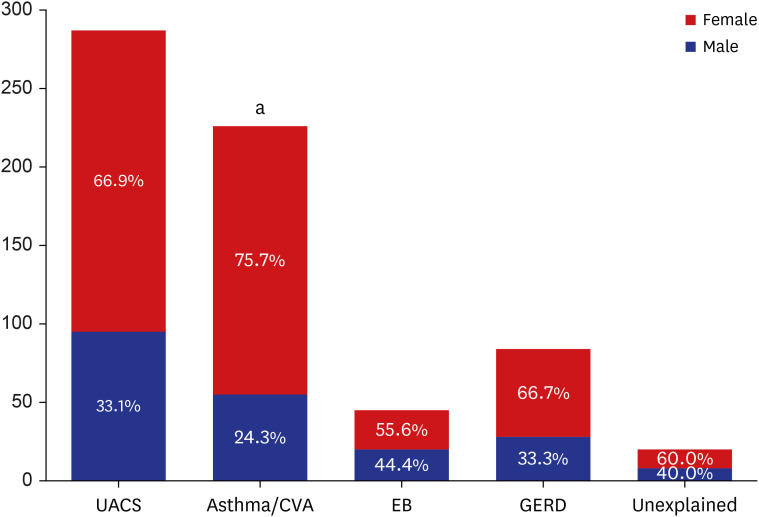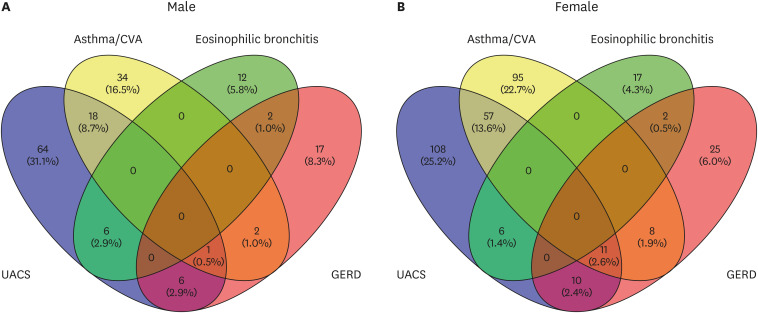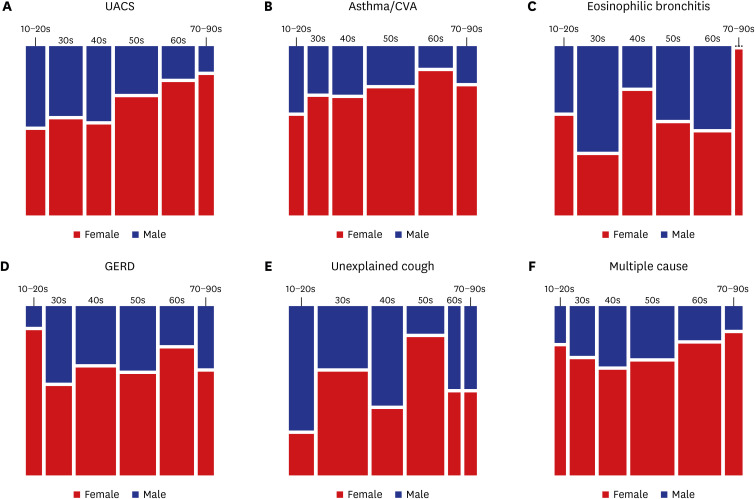J Korean Med Sci.
2024 Oct;39(38):e273. 10.3346/jkms.2024.39.e273.
Sex Differences in Chronic Cough Epidemiology: The Korean Cough Study Group
- Affiliations
-
- 1Division of Pulmonary and Critical Care Medicine, Department of Internal Medicine, Inje University Ilsan Paik Hospital, Inje University College of Medicine, Goyang, Korea
- 2Division of Rheumatology, Department of Internal Medicine, Inje University Ilsan Paik Hospital, Inje University College of Medicine, Goyang, Korea
- 3Division of Pulmonary and Critical Care Medicine, Department of Internal Medicine, Yeouido St. Mary's Hospital, College of Medicine, The Catholic University of Korea, Seoul, Korea
- 4Division of Pulmonary and Critical Care Medicine, Department of Internal Medicine, Uijeongbu St. Mary's Hospital, College of Medicine, The Catholic University of Korea, Seoul, Korea
- 5Department of Internal Medicine, Hanyang Medical Center, Hanyang University College of Medicine, Seoul, Korea
- 6Division of Pulmonary, Allergy and Critical Care Medicine, Department of Internal Medicine, Konkuk University School of Medicine, Seoul, Korea
- 7Division of Pulmonary and Critical Care Medicine, Department of Internal Medicine, National Medical Center, Seoul, Korea
- 8Department of Pulmonary, Allergy, and Critical Care Medicine, Kyung Hee University Hospital at Gangdong, Kyung Hee University School of Medicine, Seoul, Korea
- 9Division of Pulmonary and Critical Care Medicine, Department of Internal Medicine, St. Vincent's Hospital, College of Medicine, The Catholic University of Korea, Seoul, Korea
- 10Division of Pulmonary, Allergy, and Critical Care Medicine, Department of Internal Medicine, Chung-Ang University College of Medicine, Seoul, Korea
- 11Division of Pulmonary and Critical Care Medicine, Department of Internal Medicine, Seoul St. Mary's Hospital, College of Medicine, The Catholic University of Korea, Seoul, Korea
- 12Division of Pulmonary, Allergy, and Critical Care Medicine, Department of Internal Medicine, Korea University Guro Hospital, Korea University College of Medicine, Seoul, Korea
- 13Department of Internal Medicine, Hanyang University Guri Hospital, Hanyang University College of Medicine, Seoul, Korea
- 14Division of Pulmonary and Critical Care Medicine, Department of Internal Medicine, Seoul Metropolitan Government-Seoul National University Boramae Medical Center, Seoul National University College of Medicine, Seoul, Korea
- 15Division of Pulmonary, Allergy, and Critical Care Medicine, Department of Internal Medicine, Hallym University Sacred Heart Hospital, Hallym University College of Medicine, Anyang, Korea
- KMID: 2559785
- DOI: http://doi.org/10.3346/jkms.2024.39.e273
Abstract
- Background
Chronic cough is a common symptom encountered by healthcare practitioners. The global prevalence of chronic cough is 9.6%, with a female predominance. The aim of our study is to reveal the sex differences in prevalence and severity of chronic cough in South Korea, stratified by age and etiology.
Methods
This study included adult patients with chronic cough who were recruited from 19 respiratory centers in South Korea. Patients completed the cough numeric rating scale (NRS) and COugh Assessment Test (COAT) questionnaire to assess the severity and multidimensional impact of cough.
Results
Among the 625 patients, 419 (67.0%) were females, with a male-to-female ratio of 1:2.03. The mean age was 49.4 years, and the median duration of cough was 12 weeks. The mean NRS and COAT scores were 5.5 ± 1.8 and 9.5 ± 3.6, respectively. Female patients were older (45.3 ± 15.4 vs. 51.6 ± 15.2, P < 0.001) and more likely to have asthma/cough variant asthma (CVA) (26.7% vs. 40.8%, P = 0.001) than male patients. There was no difference in the duration or severity of cough between sexes, regardless of the cause. The male-tofemale ratio was lower for upper airway cough syndrome (UACS), asthma/CVA, and gastroesophageal reflux disease (GERD), but not for eosinophilic bronchitis (EB) or unexplained cough. The mean age of female patients was higher in UACS and asthma/CVA, but not in EB, GERD, or unexplained cough. The majority (24.2%) fell within the age category of 50s. The proportion of females with cough increased with age, with a significant rise in the 50s, 60s, and 70–89 age groups. The severity of cough decreased in the 50s, 60s, and 70–89 age groups, with no significant sex differences within the same age group.
Conclusion
The sex disparities in prevalence and severity of cough varied significantly depending on the age category and etiology. Understanding the specific sex-based difference could enhance comprehension of cough-related pathophysiology and treatment strategies.
Keyword
Figure
Reference
-
1. Joo H, Moon JY, An TJ, Choi H, Park SY, Yoo H, et al. Revised Korean cough guidelines, 2020: recommendations and summary statements. Tuberc Respir Dis (Seoul). 2021; 84(4):263–273. PMID: 33979988.2. Rhee CK, Jung JY, Lee SW, Kim JH, Park SY, Yoo KH, et al. The Korean cough guideline: recommendation and summary statement. Tuberc Respir Dis (Seoul). 2016; 79(1):14–21. PMID: 26770230.3. Morice AH, Fontana GA, Sovijarvi AR, Pistolesi M, Chung KF, Widdicombe J, et al. The diagnosis and management of chronic cough. Eur Respir J. 2004; 24(3):481–492. PMID: 15358710.4. Chung KF, Pavord ID. Prevalence, pathogenesis, and causes of chronic cough. Lancet. 2008; 371(9621):1364–1374. PMID: 18424325.5. Brignall K, Jayaraman B, Birring SS. Quality of life and psychosocial aspects of cough. Lung. 2008; 186(Suppl 1):S55–S58. PMID: 17939003.6. Birring SS, Prudon B, Carr AJ, Singh SJ, Morgan MD, Pavord ID. Development of a symptom specific health status measure for patients with chronic cough: Leicester Cough Questionnaire (LCQ). Thorax. 2003; 58(4):339–343. PMID: 12668799.7. Song WJ, Chang YS, Faruqi S, Kim JY, Kang MG, Kim S, et al. The global epidemiology of chronic cough in adults: a systematic review and meta-analysis. Eur Respir J. 2015; 45(5):1479–1481. PMID: 25657027.8. Chamberlain SA, Garrod R, Douiri A, Masefield S, Powell P, Bücher C, et al. The impact of chronic cough: a cross-sectional European survey. Lung. 2015; 193(3):401–408. PMID: 25787221.9. Lai K, Long L, Yi F, Tang J, Chen Z, Chen F, et al. Age and sex distribution of Chinese chronic cough patients and their relationship with Capsaicin cough sensitivity. Allergy Asthma Immunol Res. 2019; 11(6):871–884. PMID: 31552721.10. An TJ, Kim JW, Choi EY, Jang SH, Lee HY, Kang HS, et al. Clinical characteristics of chronic cough in Korea. Tuberc Respir Dis (Seoul). 2020; 83(1):31–41. PMID: 31905430.11. Koo HK, Jeong I, Kim JH, Kim SK, Shin JW, Park SY, et al. Development and validation of the COugh Assessment Test (COAT). Respirology. 2019; 24(6):551–557. PMID: 30681246.12. Bai H, Sha B, Xu X, Yu L. Gender difference in chronic cough: are women more likely to cough? Front Physiol. 2021; 12:654797. PMID: 34025449.13. Fujimura M, Kasahara K, Kamio Y, Naruse M, Hashimoto T, Matsuda T. Female gender as a determinant of cough threshold to inhaled capsaicin. Eur Respir J. 1996; 9(8):1624–1626. PMID: 8866583.14. Kelsall A, Decalmer S, McGuinness K, Woodcock A, Smith JA. Sex differences and predictors of objective cough frequency in chronic cough. Thorax. 2009; 64(5):393–398. PMID: 19131447.15. American Lung Association. Trends in asthma morbidity and mortality. Updated 2010. Accessed February 1, 2024. http://www.lungusa.org/finding-cures/ourresearch/trend-reports/asthma-trend-report.pdf .16. Centers for Disease Control and Prevention. Early Release of Selected Estimates Based on Data From the 2009 National Health Interview Survey. Hyattsville, MD, USA: National Center for Health Statistics;2010.17. de Marco R, Locatelli F, Sunyer J, Burney P. Differences in incidence of reported asthma related to age in men and women. A retrospective analysis of the data of the European Respiratory Health Survey. Am J Respir Crit Care Med. 2000; 162(1):68–74. PMID: 10903222.18. Becklake MR, Kauffmann F. Gender differences in airway behaviour over the human life span. Thorax. 1999; 54(12):1119–1138. PMID: 10567633.19. Zannolli R, Morgese G. Does puberty interfere with asthma? Med Hypotheses. 1997; 48(1):27–32. PMID: 9049986.20. Morice AH, Jakes AD, Faruqi S, Birring SS, McGarvey L, Canning B, et al. A worldwide survey of chronic cough: a manifestation of enhanced somatosensory response. Eur Respir J. 2014; 44(5):1149–1155. PMID: 25186267.21. Bewley S, McCartney M, Meads C, Rogers A. Sex, gender, and medical data. BMJ. 2021; 372:n735. PMID: 33741563.22. Regensteiner JG, Libby AM, Huxley R, Clayton JA. Integrating sex and gender considerations in research: educating the scientific workforce. Lancet Diabetes Endocrinol. 2019; 7(4):248–250. PMID: 30744946.




